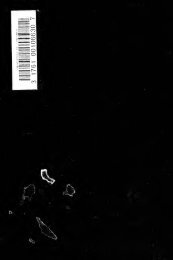Chau Ju-Kua - University of Oregon Libraries
Chau Ju-Kua - University of Oregon Libraries
Chau Ju-Kua - University of Oregon Libraries
Create successful ePaper yourself
Turn your PDF publications into a flip-book with our unique Google optimized e-Paper software.
1,22 THE ARABS. 123<br />
18) The oCourt Chronicles <strong>of</strong> the Sung-shi does not mention any visit <strong>of</strong> the Ta-shi in<br />
993, though there is one recorded in 994. A mission which came to the court in 993, is referred<br />
to in some detail in Sung-shi, ^gOjie* et seqq. The head <strong>of</strong> the mission was again the one<br />
mentioned before as P'u-hi-mi (Abu-Hamid), ali&s- Piv4o-hai. He is described as the master <strong>of</strong><br />
5 an Arab vessel, but being too old and sick to proceed to court himself, he sent his assistant<br />
captain Li-a-wu with his credentials, in which he addresses the Emperor on his own behalf,<br />
thanking him for past favours bestowed on him and the foreign trade at Canton, while<br />
explaining the reasons for his not submitting his tribute in person. Then again in 995 a tribute<br />
mission arrived under the o8hip-master» P'n-ya-t'o-li (^ iffl K^ ^^)' ^^° deputed P'u-<br />
10 hi-mi (Abu-Hamid) again to <strong>of</strong>fer his tribute at court. During the audience the emperor enquired<br />
about his country, when he stated, among other details, that «it was conterminous with Ta-ts'in,<br />
which, being a dependency, was now governed by his native country)) ( e3. ~7C ^^ ^ >|iH<br />
||lJ-^^j^J@-^;7|S0jS/f^;^).<br />
Then follows the account <strong>of</strong> the elephant<br />
and rhinoceros hunting. It will be seen that <strong>Chau</strong> <strong>Ju</strong>-kua differs by two years as to the date<br />
15 <strong>of</strong> the audience. In 988 P'u-ya-t'o-lr came again- as envoy from San-fo-ts'i.<br />
19) Sung-shi, 5,a4 records a visit to the Court <strong>of</strong> China <strong>of</strong> Ta-shi and people from Pin-<br />
t'ung-lung in the third year elii-tau (A. D. 997), but none in the third year yUng-hi; the nien-<br />
hau only differing. See also Sung-shi, 490,18^' and supra, p. 52, note 3.<br />
20) Between the visit <strong>of</strong> 997 and that <strong>of</strong> 1003, Sung-shi, 6,8, records the coming in 999 <strong>of</strong><br />
•20 « South-western barbarians, people <strong>of</strong> Chan-ch'ong and Ta-shi». The following year it notes (6,ii)<br />
the coming <strong>of</strong> people from Ta-shi, Korea, and Kau-chou ( "^ J>|4 ) aborigines. Concerning the<br />
mission <strong>of</strong> 1003, two references are made to it, in the first (7,2) it is simply stated that in the sixth<br />
year hien-p'ing San-fo-ts'i and the Ta-shi came with presents. In the second reference (490,18'') it<br />
is said that in the sixth year hien-p'ing the Ta-shi sent as envoys dP'o-lo-k'in, San-ma-ni and<br />
25 othersB (j^ ^S ^|^ ^_ ^ J8 ^^) with tribute. oMa-ni and the others were received<br />
in audience in the tJhung-ch'Sng tien (hall), etc.)). Bretschneider, Ancient Chinese and Arabs,<br />
15, referring to this mission (he puts it in 1004, and gives the name <strong>of</strong> the envoy as Po-kin-lo-sanmo-ni),<br />
is <strong>of</strong> opinion that the last three sounds <strong>of</strong> this name indicate an allusion to the Arabian<br />
dynasty <strong>of</strong> the Samanides, who reigned till the beginning <strong>of</strong> the eleventh century in the East and<br />
30 had their capital in Bokhara. Chavannes, Le Nestorianisme, 38, 40—41, says <strong>of</strong> the word<br />
Ma-(or Mo-)ni (^ IE also written "^P y|j^) that it was used solely to designate Mohamme-<br />
dans. He refers to this mission <strong>of</strong> 1003 as a pro<strong>of</strong> that the Mani were Moslim. According to<br />
Broomhall, Islam in China, 05, n. 2, Mo-ni has been sometimes used, erroneously, by tho<br />
Chinese to transcribe the word Mullah. He gives an example <strong>of</strong> this in the K'ien-lung inscription<br />
35 <strong>of</strong> 1764 in the Peking mosque on the Ch'ang-an-ta-chieh. Devgria, Musulmans et Manicheens<br />
chinois (Journ. Asiat., 1897, X, 477) looks upon the words P'o-lo-k'in-san-ma-ni as an Arabic<br />
name, such as Balkin- Samftni, or Balkin-^s-Samani. But this seems improbable. Samani is<br />
wrong, and Dev§ria confounded Samani (JiLoLw) and Sam' ani (^U^-w); furthermore Balkin<br />
cannot be an Arabic word.<br />
40 21) Sung-shi, 490,18'" referring to this mission, uses the same language as our author, but,<br />
instead <strong>of</strong> the last four characters used by <strong>Chau</strong>, it has ^ |^ j^ ^ ^ -pj,<br />
22) Conf. Sung-shi, 7,14'' and 490,18".<br />
23) According to Sung-shi, 7,i9, T'o-p'o-li came to Court in 1008, with people from San-<br />
fo-ts'i and csouth-western barbarians». In another passage (490,13'') it is said that in the third<br />
45 year hien-p'ing (A. D. 1000) «the ship-master T'o-p'o-li sent as his messenger Mu-<br />
(^ ^)<br />
ki-pi {^ ^^ ^) with presents to the Emperor; when Mu-ki-pi went back the Emperor<br />
sent to T'o-pVli a letter and also vessels (<strong>of</strong> porcelain), clothes, a saddle and a horse... :» In<br />
the tenth moon <strong>of</strong> the first year ta-chung siang-fu (A. D. 1008), while the Emperor was absent<br />
in the eastern part <strong>of</strong> the Empire for sacrificial purposes, T'o-p'o-li asked to be allowed to go<br />
50 to the T'ai-shan to there <strong>of</strong>fer his presents to the Emperor. He was allowed to do so. (The_same<br />
year) the ship-master Li-a-wu (see supra, p. 117, line 35) sent a messenger Ma-(hia-)wu<br />
(^j^ /^<br />
Mohammed) by name, who presented to the Emperor a jade -stone badge (^ ^). <strong>of</strong> great

















